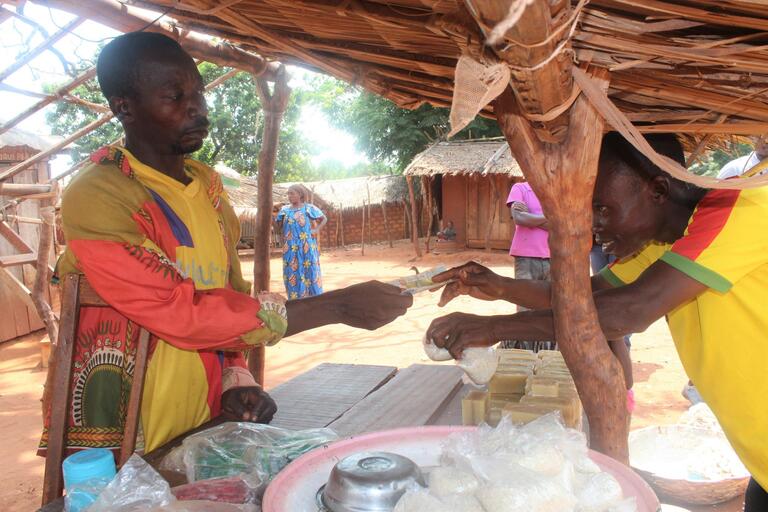Emile lives in Babaza village in the west of the Central African Republic (CAR). His country has experienced instability and armed violence for many years, leaving around half of the population in need of humanitarian support.
The Norwegian Refugee Council works to support refugees and displaced people in over 30 countries around the world, including CAR. Support our work today
In 2019, Emile’s wife fell sick. He was unable to take her to hospital in the nearby city of Berberati because at the time, armed groups were not allowing any movement outside of the town. His wife died at home, with Emile powerless to help.
In spite of his bereavement and the constant threats of violence in his area, Emile was able to start a small business. He set up a small kiosk where he would sell products such as soap, rice and cigarettes in his village’s local market. Emile’s father was a successful merchant in the village.
“It was my father who gave me the passion for business, because I used to help him sell his wares in the market when I was younger,” says Emile. With his small business, he was able to earn enough to feed his five children.
Lockdown hit families hard
All this changed after the first case of Covid-19 was reported in CAR in March 2020. Like many countries around the world, the Central African government took measures to restrict the movement of its population in order to limit the spread of the virus.
Though crucial to stopping the virus’s spread, these measures hit the already struggling economy very hard. Unable to leave their homes, many families were left without an income.
I used up all my savings during the lockdown period. Sometimes I couldn't provide breakfast for my children.Emile, 36
Emile was one of many directly affected by this situation. He could no longer go to the market to sell his products.
“It was a very scary time for me. I used up all my savings during the lockdown period. Sometimes I couldn't provide breakfast for my children,” he recalls.
Fortunately, Emile had a small cassava plot outside his house. Thanks to this, he and his family were able to eat during this difficult period.
The food insecurity brought about by the Covid-19 measures was devastating and compounded an already precarious situation. Our Food Security and Livelihoods team was well aware of the challenge and stepped up their efforts to get vital assistance to families in need.
Cash assistance brings new hope
In December 2020, Emile received a cash transfer worth 100,000 Central African CFA francs (equivalent to USD 185) from NRC’s Cash Transfer Programme, made possible through the financial support of the German Federal Foreign Office (GFFO).
Today, I can say with confidence that my life has changed because of the support I have receivedEmile, 36
In total, 140 households including Emile’s received this assistance. These cash transfers brought urgent relief to families really struggling due to the double challenge of Covid-19 restrictions and chronic instability.
With the cash assistance, Emile was able not only to get out of debt, but also to buy more wares to sell at the market.
Today, the Covid-19 restrictions are lifted and Emile is back at the market once again, selling soap, rice and other small items.
“My family and I are now getting by because of this money. Today, I can say with confidence that my life has changed because of the support I have received,” reveals Emile. He is able to pay for his children’s school fees as well as their health expenses, and has even joined a community savings group in his village.
"With my income, I have been able to save a little money in anticipation of illness or the start of my children's school year," he says.

This year CAR has experienced fresh rounds of insecurity due to political violence linked to recent elections. For Emile and the many other families affected by this crisis, things are still tough.
But Emile has confidence that he and his children can weather the storm. He is determined to not only survive but to thrive.


